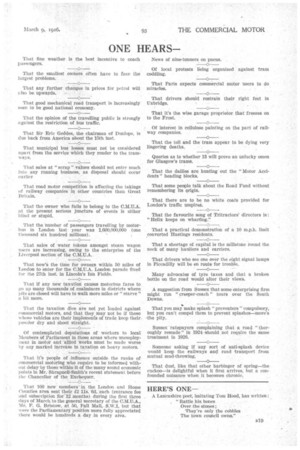ONE HEARS
Page 3

If you've noticed an error in this article please click here to report it so we can fix it.
That fine weather is the best incentive to coach passengers.
That the smallest owners often have to face. the largest problems; That any further changes in prices for petrol will also be upwards.
That good mechanical road transport is increasingly seen to be good national economy.
That the opinion of the travelling public is strongly against the restriction of bus traffic.
That Sir Eric Geddes, the chairman of Dunlops, is due back from America about the 15th inst.
That municipal bus loses must not be considered apart from the service which they render to the tramways.
That sales at " scrap " values should not enter much into any running business, as disposal should occur earlier.
That road motor competition is affecting the takings of railway companies in other countries than Great Britain.
That the owner who fails to belong to the C.M.U.S. at the present serious juncture of events is either ▪ blind or stupid.
That the -number of passengers travelling by motorbus in London last year was 1,600,000,000 (one thousand six hundred millions).
That sales of water tokens amongst steam wagon users are increasing, owing to the enterprise of the Liverpool section of the C.M.U.A.
That now'S the time for owners within 50 miles of London to enter for the C.M.U.A. London parade fixed for the 27th inst. in Lincoln's Inn Fields.
That if any new taxation causes motorbus fares to go up many thousands of coalminers in districts where pits are closed will have to walk more miles or " starve " a hit more.
That the taxation dice are not yet loaded against commercial motors, and that they may not be if those whose vehicles are their implements of trade keep theirpowder dry and shoot straight.
Of contemplated deputations of workers to local Members of Parliament in those areas where unemployment in motor and 'allied works must be made worse hy any marked increase in taxation on heavy motors.
That it's people of influence outside the ranks of commercial motoring who require to be informed without delarby those within it of the many sound economic points in Mr.Shrapnell-Smith's recent statement before the Chancellor of the Exchequer.
That 100 new members'in the London and Home Counties area sent. their £2 Us. 6d. each (entrance fee and subscription •fint'12 _months) during the first three days of March, to the general 'secretary of the C.M.UA., Mr. F. G. Bristow, at 50, Pall Mall,, SAVA, but that were the ParliaMentary position more fully appreciated there would be hundreds a -day in every area. News of nine-tonners on pneus.
Of local protests being organized against tram coddling.
That Paris expects commercial motor users to do miracles.
That drivers should restrain their right feet in Uxbridge.
That it's the wise garage proprietor that freezes on to the Frost.
. Of interest in cellulose painting on the part of railway companies.
That the toll and the tram appear to be dying very lingering deaths.
Queries as to whether 13 w• ill prove an unlucky omen for Glasgow's trams.
That the dailies are hunting out the "Motor Accidents" heading blocks.
That some people talk about the Road Fund without remembering its grigin.
That there are to be no • white coats provided for London's traffic umpires.
That the favourite song of Tritractors' directors is: "Helix keeps on wharfing."
That a practical demonstration of a 10 m.p.h. limit ,converted Hastings residents.
That a shortage of capital is the millstone round the neck of many hauliers and carriers.
That drivers who see one over the eight signal lamps in Piccadilly will be en route for trouble.
Many advocates of tyre taxes and that a broken bottle on the road would alter their views.
A suggestion from Sussex that some enterprising firm might run " creeper-coach " tours over the South Downs.
That you may make splash " preventers " compulsory, but you can't compel them to prevent splashes—more's -the pity.
Sussex ratepayers compla• ining that a road "thor oughly remade" in 1924 should not require the same treatment in 1926.
Someone asking if any sort of anti-splash device would keep the railways and road transport from mutual mud-throwing.
That dust, like that other harbinger of spring—thecuckoo—is delightful when it first arrives, but a confounded nuisance when it becomes chronic.




























